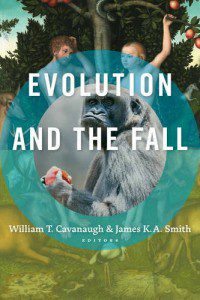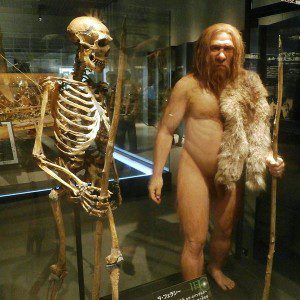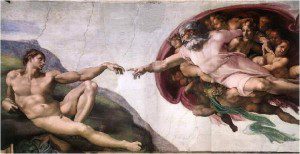 Human life isn’t random luck. Rather it is the result of divine providence.
Human life isn’t random luck. Rather it is the result of divine providence.
Darrel R. Falk, former president of BioLogos and emeritus professor of biology at Point Loma Nazarene University agrees with Dennis Venema (Adam and the Genome) when it comes to the evidence for the long history and evolutionary past of the human species. In the second chapter of the new book Evolution and the Fall edited by William Cavanaugh and James K. A. Smith, he lays out a range of evidence in the fossil record, and in the genome. Darrel is the only scientist contributing to the volume, and his contribution is important, for it lays the foundation for the rest of the book. It is the abundant evidence for a long evolutionary lineage, evolution as a population, and common descent, that drives us deeper in the search for understanding God’s world and the Holy Scripture.
Darrel’s most significant contribution, however, isn’t his presentation of the scientific evidence for human evolution. Rather his most significant contribution is the metaphysical and theological interpretation he draws from the evidence. Darrel argues that we are the result of a number of highly contingent events. A massive meteor strike that ended the age of the giant reptiles and prepared the way for the rise of mammals, about 65 million years ago. This was a highly unlikely and unpredictable event, but it appears to have happened at just the right time. Mammals were present and able to expand and diversify in the void.
 The evolutionary path in Africa that led to the development of Homo sapiens. But about 100,000 years ago something significant happened within Homo sapiens and anatomically modern humans became behaviorally modern humans. This “something” is almost certainly connected to the development of language, the capacity for symbolic thought, and a theory of the mind (i.e. the realization that other individuals have independent minds like my own). This has happened once, and only once, on the planet. Considering close relatives: Neanderthals existed for more than 150,000 years. Over this time they used tools and clothing (of some sort) and were skilled, intelligent hunters. “However, they showed little sign of creative activity. Their stone-working tools did not vary much … Neanderthals would sometimes adapt old tools to new uses, but unlike Homo sapiens … they did not excel at inventing new technologies.” (p. 7) Other species also used tools and fire. But only humans developed the capabilities required for the constant technological innovation of the last 50,000 years or so. It has been a creative, cumulative and accumulative process. (The image is a museum reconstruction of a Neanderthal male: image information.)
The evolutionary path in Africa that led to the development of Homo sapiens. But about 100,000 years ago something significant happened within Homo sapiens and anatomically modern humans became behaviorally modern humans. This “something” is almost certainly connected to the development of language, the capacity for symbolic thought, and a theory of the mind (i.e. the realization that other individuals have independent minds like my own). This has happened once, and only once, on the planet. Considering close relatives: Neanderthals existed for more than 150,000 years. Over this time they used tools and clothing (of some sort) and were skilled, intelligent hunters. “However, they showed little sign of creative activity. Their stone-working tools did not vary much … Neanderthals would sometimes adapt old tools to new uses, but unlike Homo sapiens … they did not excel at inventing new technologies.” (p. 7) Other species also used tools and fire. But only humans developed the capabilities required for the constant technological innovation of the last 50,000 years or so. It has been a creative, cumulative and accumulative process. (The image is a museum reconstruction of a Neanderthal male: image information.)
Although evolution is convergent (a point that Simon Conway Morris has argued at length in his book Life’s Solution: Inevitable Humans in a Lonely Universe), Falk argues that this isn’t enough to account for the unlikely appearance of the human race. After all, monkeys (primates) separated and populated both the old and new world some 35 to 38 million years ago. Yet nothing close to human developed independently in the new world. Australia and South America separated some 60 million years ago, and the mammals that occupied the island continent did not develop into anything with capabilities resembling humans or any of our archaic predecessors.
For that matter, there is no evidence for the appearance of any species with the characteristics that led to the development of behaviorally modern humans anywhere else on the globe. It is a one-off event. Whether the development of human capacities is a merely rare event or an extremely improbable event is open for debate. It is hard (perhaps impossible) to make any real estimate of the probability of an admittedly rare event we’ve witnessed only once.
Many scientists (Falk quotes E.O. Wilson, Stephen Jay Gould, and Henry Gee) will classify this as luck. Stephen Jay Gould (Wonderful Life: Burgess Shale and the Nature of History) used the image of the tape of life, which can never be replayed. “Replay the tape a million times from a Burgess beginning, and I doubt that anything like Homo sapiens would ever evolve again. It is, indeed, a wonderful life.“(p. 289) Falk comments:
What biology has show clearly over the past couple of decades is that historical contingency, which the pundits define as pure unadulterated luck, is by far the most crucial component of humankind’s arrival as a species. …
Although it is impossible to calculate the probability of an event that has happened only once in earth’s history, the view that we are here by luck and not divine decree is almost unanimous in the minds of evolutionary biologists. Although it is true that biologists agree that once living systems originated, certain biochemical, physiological, and even anatomical pathways become almost inevitable, this does not mean, however, that a particular species or even a particular family of species is inevitable. (p. 16)
 Unlike secular scientists, Falk suggests that we should understand our origin, despite the “odds” as an example of divine providence. This isn’t an argument for the existence of God, but rather a realization that there is another plausible interpretation of our existence on this planet. Rather than lucky accidents, we are the result of a plan and have a purpose.
Unlike secular scientists, Falk suggests that we should understand our origin, despite the “odds” as an example of divine providence. This isn’t an argument for the existence of God, but rather a realization that there is another plausible interpretation of our existence on this planet. Rather than lucky accidents, we are the result of a plan and have a purpose.
In complete contrast to the conclusions of Gee, Wilson, and Gould, and many other biologists, scientific data have been emerging that are highly consonant and beautifully consistent with the Christ who is “before all things and through whom all things hold together” (Col. 1:17 [NRSV]), and the Word “through whom all things cam into being … and without him not one thing came into being” (John 1:14 [NRSV]) (p. 21)
and Falk concludes:
The knowledge acquired from the scientific frontier opens up the opportunity for a whole new set of tools based on a different supposition: there is such a thing as divine providence. Given this supposition, the tools to explore its ramifications are theological and philosophical in nature. The frontiers these tools open up are every bit as exciting and likely even more important as they address questions foundational for the very meaning of human existence. (p. 22)
The thrust of Falk’s argument is not “Humans are improbable, therefore God exists.” To reduce it to this easily dismissed form would undercut the significance of his claim. There is nothing here that would convince non-Christians that there must be a God. Rather, as Christians, the highly contingent and improbable truth of our existence should bring a new and deep appreciation for the providence of God. This should, Falk suggests, shape the theology and philosophy to come in the subsequent chapters.
What do you think of Falk’s argument?
Does this cast the question of evolution in a different light?
If you wish to contact me directly you may do so at rjs4mail[at]att.net.
If interested you can subscribe to a full text feed of my posts at Musings on Science and Theology.
















